FRIDAY
JUNE 14, 2024
SEATTLE


FRIDAY
JUNE 14, 2024

AG Bob Ferguson talks about his record on civil rights and race for governor
 BY MATT NAGLE SGN CONTRIBUTING WRITER
BY MATT NAGLE SGN CONTRIBUTING WRITER
When Washington State Attorney General Bob Ferguson was elected to office, one of his top priorities was to establish the Wing Luke Civil Rights Division. This was breaching new territory in that, prior to Ferguson, anyone who called the AG’s office with a civil rights complaint would be referred elsewhere, and he said this just did not sit right with him.
“Not one single person in our office did civil rights work on behalf of the people, so I created the Civil Rights Division,” he said. “With close to 30 people working in that division, it is by any measure the best civil rights division in the country. That team does amazing work.”
What followed were numerous civil rights cases that positively impacted the LGBTQ and BIPOC communities alike.
SEE FERGUSON PAGE 6
 BY HANNAH SAUNDERS SGN CONTRIBUTING WRITER
BY HANNAH SAUNDERS SGN CONTRIBUTING WRITER
In late May the Yakima City Council rejected a proclamation declaring June as LGBTQ2S+ Pride Month in the city. While the Queer community and the former mayor are disappointed in the decision, out and proud Queer people and their allies nevertheless turned out for Yakima’s Pride parade and festival.
“Rejecting the Pride proclamation is being seen as a betrayal [of] a wide swath of our citizenry,” Janice Deccio, a current council member and former mayor, told
the SGN. “The LGBTQ+ community is an important part of our city, and I want them to know that I understand the importance of recognizing the struggles they’ve had to face as they strive for equality and equity ” Within the proclamation were mentions of the historic Stonewall riots of 1969, which are a cornerstone of the LGBTQ+ rights movement, and a reminder that equality and progress are accomplished through resilience, determination, and collective action. The proclamation also highlighted how the city sits on the ancestral lands of the Yakima Nation and 14 Confederated Tribes, and it
YAKIMA PAGE 8

“Celebrating 50 years of the Seattle Gay News” Seattle Public Library to host exhibit of the newspaper’s legacy, with a free public reception on June 27
BY MATT NAGLE SGN CONTRIBUTING WRITERThe year was 1974, and Seattle’s Queer community was more freely coming into its own. The City of Seattle banned employment and housing discrimination against sexual minorities the previous year, and Seattle’s first Gay Pride Week was to be held.
Milestones like these helped unleash the unapologetically out and proud LGBTQ community in the Emerald City — and this was literally put on paper when the Seattle Gay News debuted, also in 1974, first as a publication of the Gay Community Center,
also founded that same year. The SGN ’s staying power has led to it become among the country’s longest-lasting LGBTQ printed publications.
Now new generations can witness the SGN ’s odyssey in an exhibit opening June 24 and running for a month at the Seattle Public Library’s Central Library downtown. “Celebrating 50 Years of the Seattle Gay News” features issues of the SGN going back to its earliest days and forward again, taking viewers on a journey through historic events that helped shape local Queer politics and culture.
PAGE 4









[…] And the beat goes on… What a battle cry! This is the motivating motto of Seattle’s “state of the art night spot,” the incomparable Brass Door, located on the corner of Pike and Harvard Streets in the heart of Capitol Hill. All in all, the management and staff of this disco have overcome all obstacles, to become perhaps the most popular club on the Seattle gay scene. Those involved have become a close knit family, which has enabled them to evolve from a neighborhood bar into a first-class establishment. A self-proclaimed “idea factory,” this club has one thing in mind: to please the city of Seattle.
Owners Greg and Ken have had control since the bar’s opening in July of 1977, and they have progressively become the city’s top management team since that time. Their professional attitudes have assured
the people of this area that innovation is on the rise and imagination has a place in today’s society. Only a few bars on the coast (the only other in Seattle, I believe, is Images) have the potential for national recognition. The Brass Door certainly leads this list. […]
Its amenities include the most diverse and current music in the city, directed by Seattle’s nationally known disc jockey (and my personal choice for Entertainer of the Year), Paul Curtis. The crowd packs the small, but increasingly intimate dance floor on any given night to the spinning of Paul and his booth partner Gary T. But this establishment has room for other types of activity as well, from pool to pinball.[…]
Jim Moran just took over as manager for Rod Reinhart, who wen on to Hawaii; Jim plans to add his sense of style to the incred-
Lindibly talented group already assembled. The staff (night manager Bill, bartenders Randy and Lance, waiter Lance, coat checker Lee and doorman Brad) are probably the finest and most professional group in the city.
As you all know, this institution in Seattle gay life has encountered many recent rough spots, but they have learned from each difficulty and improved their sense of direction. Time can only tell what further successes are in store, but in the words of Greg and Ken, “…if you support us, we will support you.” Seattle, there is no question that you are finally on a two-way street. And for once, a happy ending.
This article was edited for length. To view the article in full, visit: https://issuu. com/sgn.org/docs/sgn_june_5_1981
A reception will be held at the library on Thursday, June 27, from 5 to 7 p.m. This event is free and open to the public and will feature SGN staff, LGBTQ community leaders, and dignitaries, including Mayor Bruce Harrell.
Starting with the origins of the SGN, the exhibit is organized around pertinent topics, such as legal rights, Gays in the military, marriage equality, the AIDS crisis, and much more. Pages from the paper are shared through a combination of enlarged reproductions on informative placards and actual issues in glass cases. Visitors can roam freely and experience the displays at their leisure.
The exhibit made its public debut this past April at the University of Washington’s Allen Library. How this came about goes back to the COVID years. After the sudden death of SGN publisher and owner George Bakan on June 7, 2020, then-SPL Executive Director Marcellus Turner read a story online about efforts germinating to archive the paper. The story featured a concerning photo that propelled Turner to contact the University of Washington Libraries.
UW Libraries News Librarian Jessica Albano, who created the exhibit, recalled this moment that sparked what would become a years-long project to archive all five decades of the SGN
“The story showed piles and piles of SGNs stacked outside, under George’s carport,” she said, “and how they were trying to collect it, preserve it, and distribute it to libraries,” thus rescuing the stacks from ruin or discard.
This led to a multi-institutional network that included UW Libraries, the Seattle Public Library, the Museum of History and Industry, the Seattle Municipal Archives, and the Washington State Library, as well as SGN staff and Bakan’s daughter, Angela Cragin, who inherited the paper. Meetings were held monthly.
All the newspapers from Bakan’s storage units were gathered and delivered to the team’s meeting space for volunteers from the community and the library to sort for eventual distribution to archives across the country, so that multiple institutions would keep a print run of the collection.
The most complete set went to the SGN and the second most complete went to UW Libraries. More were sent to Yale University and the Stonewall Museum in Florida, among others. The Seattle Public Library has two sets, one kept on shelves for the public to peruse and another kept safely in a closed archive.
UW Libraries continued to microfilm each issue through 2020 — all 1,745 of them — and all are available free online through the Washington State Library’s Washington Digital Newspapers website (https://bit.ly/3L01oQl).
Albano said she worked with UW Libraries student employees to go through every issue and compare it to microfilm that the UW had already created from editions of the paper it had previously.
“We were able to find things that were missing from the microfilm. There are issues that we may not have had when we filmed it the first time that we now have in print,” she said. “We still have more we’re trying to do, because we have some issues that we don’t have any copies of.”
For posterity and pride
Albano expressed special gratitude for longtime SGN staff member Rick McKinnon for his invaluable and ongoing help.
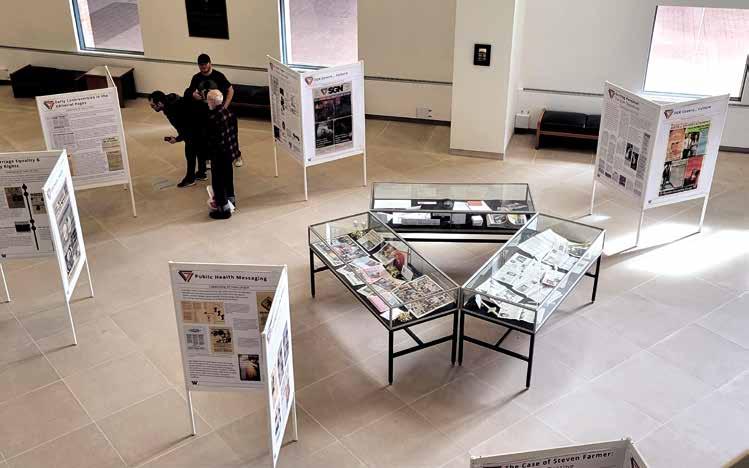

THE 50-YEAR ARCHIVING UNDERTAKING WAS SPARKED BY THIS IMAGE OF SGNS STACKED OUTSIDE THE HOME OF LATE OWNER AND PUBLISHER GEORGE BAKAN – ANGELA CRAGIN
“Every

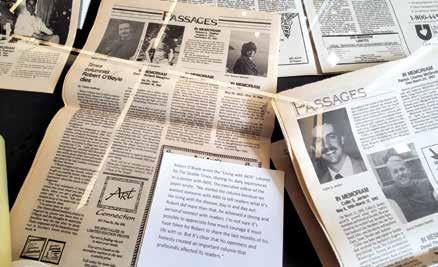
time I work with a local community newspaper, I learn the value in local publications and how they tell the story not just of the general community in the Seattle area. If they are publications for and by a specific group, they are invaluable for documenting what happened, the good and the bad.”
She continues working with him to find still-missing editions, so that UW Libraries can have a complete run on microfilm, then digitize those through the Washington State Library for a complete online collection.
“He is such a great guy,” Albano said of McKinnon. “He’s just relentless in such a positive way. He’s determined to help us get a complete run, and I really appreciate it. He is such a good networker on our behalf.”
It was McKinnon who reached out to the Seattle Public Library to tell them about the exhibit at the UW’s Allen Library, which prompted the city’s library to ask if they could show it too.
Albano said that with the demise of newspapers across the country, her vision is that the SGN archives will be there for posterity as a source of information, reflection, and pride for LGBTQ generations to come.
“Every time I work with a local community newspaper, I learn the value in local publications and how they tell the story not just of the general community in the Seattle area. If they are publications for and by a specific group, they are invaluable for documenting what happened, the good and the bad, the photographs in them showing the people…,” she said.
“The SGN is important and unique. With the work we’re doing, I’m hoping that 50 years from now, someone will pull out SGNs from today. That’s my hope.”
The exhibit opens on June 24 at the Central Library (1000 Fourth Ave., downtown) and runs for a month. A free public reception will be held Thursday, June 27, from 5 to 7 p.m.

Now that Ferguson is running for Washington state governor, he intends to continue his legacy of civil rights advocacy, especially with the possibility of a Trump presidency looming.
“If that dark day arrives, I think Washingtonians will want to have a governor who knows how to stand up to Donald Trump and protect their rights,” Ferguson said.
Dignity and respect
Ferguson said it is important to him for many reasons to support LGBTQ Americans.
“Fundamentally, I believe that everybody should be treated with dignity and respect, no matter who they are or what they look like or who they love,” he said. “I was fortunate to be raised in a household with parents who believed that and imparted that in all seven of their kids.”
Looking back on his childhood in the 1970s, Ferguson fondly remembers a favorite Gay uncle who Ferguson said was treated just like another member of the family. This was at a time when not all Gay men could say their families gave them unconditional love.
“He was not treated any differently by any of his siblings, and that was a good lesson for me as a young boy at the time,” Ferguson said. “It’s important for all of us, no matter what role we have as an individual, as an attorney general, to make sure we’re doing everything we can to ensure that folks are treated with dignity and respect.”
That his uncle’s name was also Robert Ferguson leads to amusing moments, such as when AG Ferguson is taken for an artist when visitors to his office see his uncle’s signed works on his walls.
Defending Queer lives
This foundation in inclusivity propelled Ferguson and his team to take on several LGBTQ-related legal issues through the Wing Luke Civil Rights Division. An example is the consumer protection lawsuit he filed in 2013 against Arlene’s Flowers and Gifts in Richland, Wash. Owner Barronelle Stutzman had refused to provide wedding flowers to long-time customer Robert Ingersoll, based on her opposition to samesex marriage. On Nov. 15, 2016, Ferguson argued the case before the Washington Supreme Court, the first and only case he argued personally as attorney general.
“I was just so outraged by the way this couple was treated,” he said. “I remember thinking to myself that if I argued it personally, every justice on the Supreme Court would know that I cared that much. I wanted them to see me up there arguing that, because I wanted to send that message to the court.”
Stutzman kept fighting back, but she ultimately opted to offer a cash settlement to keep her legal fees from escalating further.
“The team did a fantastic job on it. That was one that I was proud of personally and proud of for the office,” Ferguson said. “It was one of our first big civil rights cases on behalf of the LGBTQ community and it had national attention. It was a great result.”
In 2017, Ferguson led a coalition of 17 states and the District of Columbia in urging the United States Court of Appeals for the 4th Circuit to uphold the right of Gavin Grimm, a Transgender student in Virginia, to use the school bathroom corresponding to his gender identity. Ferguson filed a key legal brief in this first Transgender rights case ever heard before the US Supreme Court. Grimm emerged as the victor.
“The fact that it wasn’t a case filed in Washington didn’t make any difference to me. We knew the rights of Transgender individuals here in Washington state could be impacted by that case,” Ferguson said. “That’s why we wanted to write and lead that brief in support of that community here in our state and across the country.”
Filing a legal brief for a case outside of Washington state was a rare move for Ferguson.

“I believe that everybody should be treated with dignity and respect, no matter who they are or what they look like or who they love.”
“As attorney general, I have the ability to file a legal brief in any court in the country,” Ferguson explained. “We use that sparingly, for obvious reasons, because there are a zillion cases going on, but we do file these legal briefs if there is a case in another state or jurisdiction where there is a legal issue that we think is so important that we want to make sure the voices of Washingtonians are heard before that case is decided.”
In more strategies to defend Transgender rights, Ferguson and 18 attorneys general signed onto a letter in 2017 urging members of the Armed Services Committees of the US House and Senate to stand with Transgender military service members and protect their right to serve. That same year, he went to federal court, asking it to allow the State of Washington to join a federal lawsuit challenging then-President Donald Trump’s ban on Transgender people serving in the military.
Most recently, Ferguson helped block a challenge to our state’s ban on conversion therapy. He appeared before the US Court of Appeals for the 9th Circuit in 2022 to ask the judges to uphold the law, and the court agreed.
“I don’t go weighing in on legislation all the time as attorney general. I’m not a legislator, but I did support this, and I was proud of my team for successfully upholding that law in court,” he said. “Even in a state like Washington, the rights and dignity of all
Washingtonians can be under threat and under attack. I’m thankful that we have a state with leaders like Sen. Marko Liias and Sen. Jamie Pedersen who stand up. For us, it was an honor to defend that law.”
After serving 12 years as Washington state’s 18th attorney general, first elected in 2012 and re-elected in 2016 and 2020, Ferguson saw an opportunity when Gov. Jay Inslee announced that he would not seek his fourth term in office. Ferguson is among a field of 28 candidates vying for the seat.
When asked why he joined the race, Ferguson replied, “It’s a feeling of being able to use the powers of that office to continue my focus on advocating for Washingtonians and trying to make life better for them.”
Ferguson said he is the only candidate running who does not accept money from large corporations or corporate political action committees.
“That is not the easy way to raise the $15 million I need to run, but I’m trying to communicate that my campaign, and my administration if I’m elected, is focused on the people.”
Washington state hasn’t had a Republican governor since John Spellman, who served one term from 1981 to 1985. The leading Republican candidates this year are former US Rep. Dave Reichert and Semi Bird, the latter of whom was endorsed by the party.
This year’s presidential election could also open the door for a successful Republican candidate, the frontrunner currently being Donald Trump.
Ferguson is familiar with a Trump presidency from having pushed back against him while Trump was in office, including delivering the president’s first defeat. Through Ferguson’s Civil Rights Division, in 2017 a federal court challenge forced Trump to capitulate on his travel ban, which used an executive order to bar travelers from Iran, Iraq, Libya, Somalia, Sudan, Syria, and Yemen for 90 days. US District Court Senior Judge James L. Robart issued an injunction halting the order after Ferguson filed his lawsuit challenging key provisions of the order as illegal and unconstitutional. Numerous key provisions challenged by Ferguson were eliminated or restricted in the order that Trump had to revise, including bans on green card holders, visa holders, and dual citizens; an indefinite ban on Syrian refugees; and explicit preferences based on religion. In addition, Iraq was removed from the travel ban list.
In 2019, Ferguson filed his 50th lawsuit against the Trump administration when it ruled to significantly undermine the Endangered Species Act.
Back home in Washington, Ferguson said he understands that he will be in the middle of a tight race.
“Chris Gregoire, when she first ran for governor, won by just 133 votes. Jay Inslee, when he first ran for governor, ran a very hard-fought race against Rob McKenna and in the end won by just three percentage points,” he said. “Those were the last two campaigns for governor without an incumbent, like this one. We expect this race to be as close as those two races.”


“I’m not going to give a comment to you about that, and I’m in the middle of something,” Byers told the SGN when asked about her no vote.
BY KYLIN BROWN SGN CONTRIBUTING WRITEROn Sunday, June 23, Poulsbo-based Rockin’ Ruby’s Records will host a benefit concert in honor of Nex Benedict, a TwoSpirit Indigenous, Nonbinary Oklahoma teen who was reported to have committed suicide following a February assault by a group of high school classmates.
The set at “Concert 4 Nex” will feature local Queer musicians Russian Blue, Mikus, Jordan Eller, and Mushi Bonez. All ticket proceeds will go to Freedom Oklahoma and Queer the Land.
“We will be raising funds for BIPOC & 2SLGBTQIA+ organizations who are advocating, support and fighting for our rights and livelihoods within communities! We hold this concert in solidarity and mourning for Nex’s life,” reads the organizer’s description.
The show will be held at Rolling Bay Hall on Bainbridge Island from 3 p.m. to 7 p.m., and all ages are welcome. Organizers request attendees to mask, and the space is wheelchair accessible.
Tickets are $20 and will be available at the door.
paid respect to the cultural significance of Native American Two-Spirit people, “who have historically occupied a distinct, alternative gender status within their Tribes.”
The Yakima City Council held a meeting on May 21, where it approved numerous proclamations, including for Missing and Unidentified Persons Awareness Month. Shortly after Mayor Patricia Byers introduced the Pride proclamation, Councilmember Rick Glenn asked, “Why are we honoring this?”
Councilmember Deccio swiftly motioned to approve the proclamation, and was seconded by Councilmember Danny Herrera. The pair were outvoted 5-2, with Mayor Byers and Councilmembers Glenn, Matt Brown, Leo Roy, and Reedy Berg rejecting the proclamation.
Councilmember Deccio told the SGN that she approved of the Pride proclamation because voting yes was the right thing for the city to do.
“All City of Yakima proclamations are vetted to ensure they meet qualifications before being brought to the council to vote. The same Pride proclamation has been approved by the council since 2016, and I have been happy to read them at Pride events for the last two years as the former mayor,” Deccio said. “Our place as councilmembers is not to vote based on personal beliefs but with impartiality.”
Aftermath
Joshua Hastings, president of Yakima Pride, issued a statement following the council’s decision and said it’s not only
disappointing but that it’s also a “blatant disregard for a significant segment of our community. This decision erodes the very foundation of inclusivity this city claims to uphold.”
Hastings reminded the statement’s readers that the LGBTQ2S+ community is not invisible, but that they are the community’s teachers, firefighters, and small business owners, and that they contribute to the vibrancy and growth of Yakima.
“Yet, by rejecting this proclamation, you’ve chosen to marginalize us, sending us a message that our voices and experiences don’t matter,” Hastings said. “The proposed proclamation wasn’t just a symbolic gesture; it was a recognition of the ongoing struggles for equality and a celebration of our diverse identities.”
Hastings noted how the council’s vote disproportionately impacts LGBTQ2S+ youth, who struggle with self-acceptance and societal bias, and it tells them that
they’re unwelcome, unseen, and unsupported by city leadership.
Yakima Pride demanded that the council reverse its decision and open up dialogue with the Queer community to understand the importance of Pride Month and to collaborate in order to truly celebrate diversity and inclusion for all.
Councilmember Deccio is glad that the Pride parade is going to continue, where thousands of people turn out to celebrate. Deccio said those parades are always joyful, fun events for the entire community.
Yakima Pride held its parade and festival on June 8, marching just one street over from city hall. Attendees brought out a 130-foot Pride flag, and the lively festival was full of entertainment and food.
Yakima Pride told the SGN that it is not taking media requests at this time. Councilmembers Brown, Roy, Glenn, and Berg did not respond to the SGN ’s numerous requests for comment.
Willapa Valley Lavender Farm, an 11-minute drive from Raymond, WA, is a picturesque place to picnic and purchase bunches of lavender. When they aren’t maintaining the flowers or creating fragrant body products, owners Jeff and Paul Karnatz take care of their children and their community.
The farm started in 2017 when Jeff moved from Phoenix, AZ, alongside his sister Kim Avery. After nurturing about 7,000 plants, they started to hold events and create products. Paul joined the farm in 2018 with a background in horticulture and landscape design — perfect for the job.
“Being on a lavender farm was like Disneyland for me,” Paul said.
Events at the lavender farm
The Karnatzes have hosted a plethora of events at the farm over the years, including the early years of Pacific County Pride, which originally started as a small private gathering, after the people running it weren’t able to. It’s now a public event held in Raymond and Long Beach (this year on June 22 and 23).
Jeff and Paul also host the Willapa Valley Music Festival, a free happening featuring local musicians. Paul says it’s common for lavender farms to hold lavender festivals, so the music-forward one helped differentiate Willapa Valley from the others.
“Jeff thought, ‘Let’s do a music festival,’” Paul said. “We’re still bringing people to the lavender farm — they can walk in the lavender, take lots of pictures in the lavender, cut some lavender, and take it home — but it also played on his passion for music and…for community, to make it free.”
The first year saw a turnout of 100 people, and it only grew from there. By its third year, the festival had gathered sponsors and over 700 attendees.

“The idea was to support local artists and provide the community with something that was meaningful. And people showed up — it was clearly something that was nonexistent in the community, but people were really curious and interested,” Paul said. “What are the odds of two Gay dudes, out in the country, throwing this big festival and all these locals showing up?”
Outside of the farm, the two help host a different music festival downtown and the Christmas parade. Jeff also manages the Raymond Theatre, and Paul takes care of an animal sanctuary. Jeff says having events like the farm’s music festival and bazaars sparked their civic involvement.
“Having the lavender farm and then inviting the community out to the farm is kind of how we got involved with everything that we do in Pacific County,” he said. “I think what really made them identify with us was we
were farmers just like them. We were integrated into their community and did what they do.”
The lavender twins
This year, the couple will take a break from the music festival to take care of their two children, who have been called “the lavender twins.” After looking into the foster-to-adopt process, the couple decided it wasn’t the correct fit. At the same time, Paul, a first-grade teacher in the area, had a conversation with a coworker who had thought about surrogacy before. After being gifted embryos by a couple in Florida and going through the process twice, the twins were born.
“With all that, we always kept the community involved. Everybody wanted to know — they were all part of it. We had a baby shower, and we had it at the store, and a lot of the community came and took care of them,” Jeff
said. “People will walk in and get coffee, and I’ll have the babies. They just take [a] baby from us and carry them around while we’re making their coffee. It’s super cute.”
For Paul, one of the cool parts of living in a rural area has been the opportunities to be involved with its government, businesses, and economy, which are more intimate than in a big city. He says there can also be an issue of quality of life for Queer people attracted to a rural lifestyle.
“Any type of life is possible. For many many years, I had a dream of living in the country and having horses and a farm, but when I was a young Gay adolescent, I sort of felt like that was not realistic,” Paul said.
“If you want to be Queer and live out in rural Washington state, there is a place for you.”




Minnesota:
Lawmakers forbid libraries from banning LGBTQ+ books
Last week, Minnesota Gov. Tim Walz signed a law that will prevent K-12 schools, colleges, and public libraries from needing to comply with book or materials removal requests “based solely on the viewpoint, content, message, idea, or opinion conveyed” in their text.
State File 3567 requires that all decisions regarding what materials to stock be overseen by “a licensed library media specialist, an individual with a master’s degree in library sciences or library and information sciences, or a professional librarian or person with extensive library collection management experience,” according to the state House website.
Walz affirmed that “censorship has no place in our libraries.” “As a former teacher, I’m clear: We need to remember our history, not erase it,” he posted on X on May 17.
The governor has previously criticized GOP-majority states that have passed book bans limiting students’ access LGBTQ+ materials. To date, 15 states have statutes limiting the teaching of LGBTQ+ subjects in schools.
“Those who have asked for book bans have never been on the right side of history. They have never been viewed as being the folks that were the heroes of freedom, they have never been viewed as the people that were looking out for others,” Walz told Minnesota Public Radio.
“Trying to tell someone else’s children that they can’t read The Hobbit, or whatever it might be, you’re in the wrong.”
Amid the latest waves of attacks on LGBTQ+ rights and representation, the state also passed a “shield law” in 2023 that prevents courts from complying with subpoena requests in cases where a Trans youth and their family travel out of state to receive gender-affirming health care, while 25 other states had enacted restrictions on the types of treatment that can be offered to Trans minors.
NYC: Bill to rename subway stop in honor of Stonewall
New legislation proposed and approved by lawmakers this session would rename a New York City subway station to commemorate the Stonewall riots, a landmark in the LGBTQ+ rights movement.
On June 5, the state legislature approved the bill, which would direct the Metropolitan Transportation Authority to change the name of the Christopher Street–Sheridan Square subway station in Greenwich Village to the Christopher Street–Stonewall National Monument Station.
“This change will memorialize the history of the modern LGBTQ civil rights movement and inspire NY to demand justice and equality for all,” state Sen. Brad Hoylman-Sigal, a Manhattan Democrat who sponsored the proposal, posted on X after the Senate’s passage of the measure.
The bill now heads to Democratic Gov. Kathy Hochul for her approval. Her office said it will review the legislation early the week of June 10.

Colorado: GOP newsletter calls Queer people “godless groomers,” advocates burning of Pride flags
A recent email newsletter from the Colorado Republican Party, surfaced by Denver-based journalist Kyle Clark, refers to LGBTQ+ people as “godless groomers in our society” and includes a video sermon from evangelical pastor Mark Driscoll, who has previously declared “war on the LGBT agenda.”
The thumbnail for the video is an image of Jesus with glowing red eyes superimposed on a Pride flag with the text “GOD HATES FLAGS” (an echo of Westboro Baptist Church’s “God Hates Fags”) and a caption quoting Driscoll, saying the “Pride Month/Agenda” is “darkness.”
Georgia: LGBTQ+ rights under threat
On June 4, Georgia’s ruling party, Georgian Dream, introduced draft legislation curtailing LGBTQ+ rights.
The proposals are similar to laws enacted in Russia banning same-sex marriages, adoption by same-sex couples, public endorsement of same-sex relations at gatherings and at educational institutions, gender-affirming care, and changing one’s gender marker in the official documents. It also would require the erasure of references to LGBTQ+ people from public spaces and media (including TV and movies), and schools would be banned from making information available that supposedly “promotes belonging to the opposite sex” or “same-sex relations.”
The new initiative was announced by Shalva Papuashvili, parliament speaker and Georgian Dream, member just a day after he signed the “foreign influence” law into force, which has ignited mass protests and slashed the country’s chances of being added into the European Union, just six months after the country was offered candidate status.
Australia and UK : Lesbian dating apps exclude Trans women
In two different hemispheres, dating apps aimed at excluding Trans Lesbians have been announced, both of which market the use of facial recognition software to do so. UK-based developer Jenny Watson says her application, L’app, will utilize what she has dubbed “sex recognition software,” which analyzes “bone structure, features, movement & heat emissions” to determine one’s womanhood.
In comments to the Daily Mail , Watson said that the Trans-exclusionary app was
inspired by her personal experiences on other Lesbian dating apps. Apparently, her inclination toward “transvestigating” has led to her being banned from Lesbianoriented apps on the market. In the same interview, she referred to Trans women as “Trans-identified males.”
L’app is set to be released at the end of Pride Month, a disappointment to HER founder Robyn Exton, who said, “This is a month where we’re supposed to talk about rights, equality, and equal access for our whole community, and this is the time when you choose to build a platform where you intentionally discriminate against part of our community.”
Since its 2015 launch, the social app HER has garnered over 13 million members worldwide.
Meanwhile, in Australia, the app Giggle for Girls is facing a lawsuit over genderbased discrimination for excluding Trans women from a service for women.
In a recent conversation with Al Jazeera, the app’s creator, Sally Grover, acknowledged that she had manually removed a Trans woman named Roxanne Tickle without thinking twice, repeatedly calling Tickle a man.
“It did not register, as we get men trying to enter all the time. Mr. Tickle passed our AI facial recognition test, which was deliberately set at 94% accuracy, meaning that some men will get through,” she said. In her suit, Ms. Tickle argues that she is legally entitled to use services meant for women and has been discriminated against on the basis of gender identity. This argument relies on a 2013 amendment to Australia’s Anti-Discrimination Act that added gender identity to the list of protected categories.
Tickle is seeking 200,000 Australian dollars in compensation. The results of this case will set precedent for legal definitions of sex and gender, and ultimately,
After Clark published screenshots of the email on X, the party’s official account quoted his post with a GIF of animated flames, writing, “Burn all the #pride flags this June.”
In response, Clark wrote that the call to burn the Pride flags “reflects that the state party’s allegiance is to the values of state chairman Dave Williams, even more so than those of Donald Trump.”
Williams, who currently serves as the chair of Colorado’s GOP, supported a 2020 measure to ban same-sex marriage and created an issue committee in 2023 to ban gender-affirming care for minors.

what it means to be classified as a woman.
The defense has so far failed to get the case thrown out, and the judge is expected to issue his decision in the coming months.
Europe: Right-wing parties make gains in elections, raising alarms
Concerns for LGBTQ+ rights have grown following the 2024 European Parliament elections, in which right-wing parties gained significant ground.
Those parties, known for their conservative social values, could affect the broader political dynamics in Europe, including Marine Le Pen’s National Rally in France, which won over 32% of the vote there, and the far-right Alternative for Germany, which secured approximately 16% there, becoming the country’s second-largest party.
The European Conservatives and Reformists (ECR) also gained four seats, bringing their total to 73, and Identity and Democracy gained nine seats to reach 58. Together, these nationalist, anti-immigrant
parties now hold around 130 seats in the European Parliament, reflecting their growing influence.
As restrictions on LGBTQ+ rights surge across the globe, including opposing marriage and adoption by same-sex couples and challenging the legal recognition of gender identity and access to healthcare for Transgender people, potential policy reversals in Europe feel closer than ever in recent years. As farright and Christian-affiliated parties like these often promote traditional gender roles and family structures, acceptance of LGBTQ+ identities is threatened.
Moreover, the rising popularity of farright ideologies is associated with heightened discrimination and hate speech against LGBTQ+ people.
While these right-wing gains will definitely steer the European Parliament slightly from the center, they were not as large as predicted, and the center still holds.

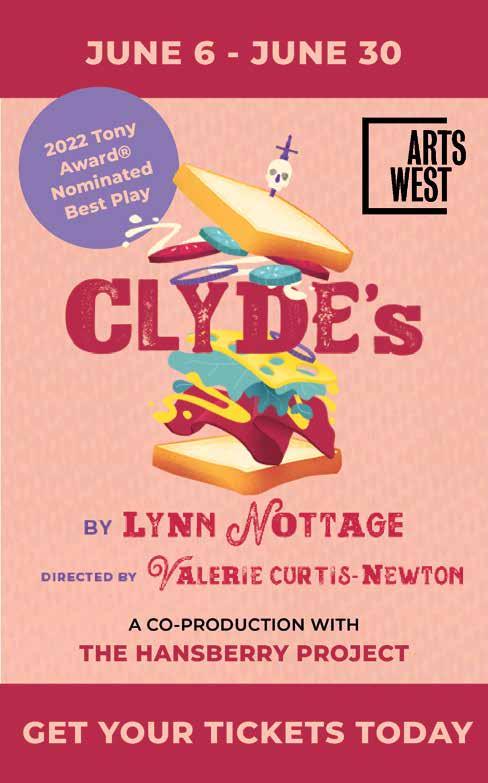





















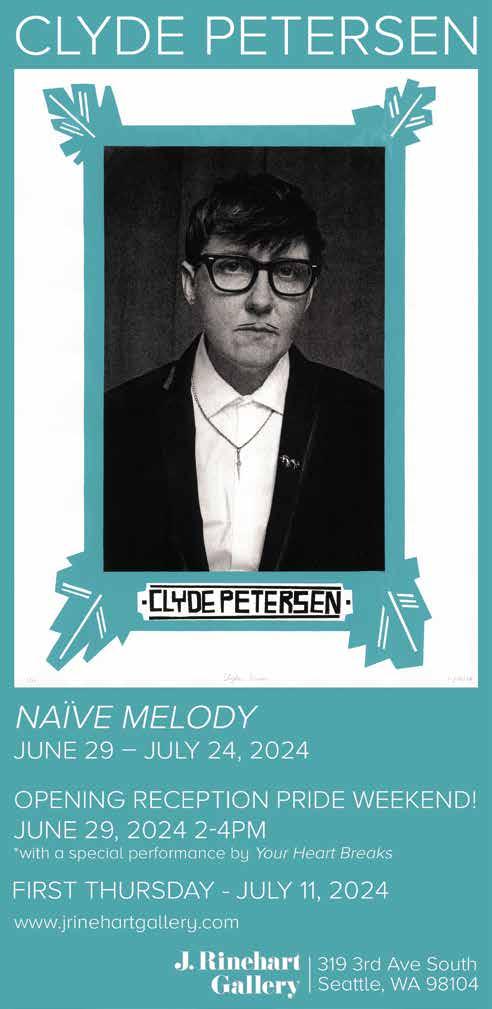
Michael Carbonaro has performed over 500 comically perplexing and improbable feats of magic on his hit hidden-camera TV series The Carbonaro Effect on truTV, and once again, he is taking his show on the road. If you have ever wondered what it must feel like to be on the other side of the charmingly devious Carbonaro as he works his magic to make people believe the unbelievable, now is your chance to find out.
I have been a fan of Carbonaro since seeing him in Another Gay Movie, a cult classic from 18 years ago. I had a chance to chat with him over Zoom a few weeks ago. Here are some excerpts:
On his influences:
“My first love was special makeup effects, especially in horror movies and anything with cool, practical effects. In my TV show The Carbonaro Effect, we combined magic with practical effects on real people, like live practical effects…
“Growing up, it was all about David Copperfield and Penn and Teller, who brought that wild edge to things… When I went to NYU, I initially studied theater with the goal of becoming the next David Copperfield. But during training, I discovered a talent for comic acting, …stand-up comedy, and improv. I found myself torn

between being a magician or an actor, a question I still ponder today.
“However, The Carbonaro Effect allowed me to blend acting, improv, and magic in real scenarios with real people, creating a brilliant mix of my passions. Similarly, I adore performing live, relishing the improvisational nature of interacting with the audience during my magic shows. Every performance is unique, keeping me on my toes, and I absolutely love it.”
On the stage show:
“Well, it’s all-ages, which is my favorite kind of show to do. …It’s not a kid’s show, but it’s an all-ages show. And I just love that audience to play on a lot of different levels. It’s tons of audience participation: people coming up and helping out with the tricks, me going out into the audience and playing with people right in their seats.
“I have [a part of] the show where I teach everyone how they can perform a Carbonaro Effect prank of their very own, kind of
take them behind the scenes, orchestrating it. And then, as a grand finale, I take two people from the audience and make them disappear on stage every night.”
On marriage to Peter Stickles:
“We’ve been married for 11 years, probably together for a few before that. We met through MySpace because of a mutual friend. I saw he was in a movie, and we hit it off over our roles in Another Gay Movie and Shortbus. We fell in love at the Shortbus DVD release party. Peter’s on the road with me, helping backstage and taking care of our poodle.”
On his future plans:
“I’m constantly juggling four magic TV projects, though none are greenlit yet. With The Carbonaro Effect, I ended it on a high note, transforming into a 14-year-old magician for the final episode. While some want more seasons, I’m focused on new ventures. It’s frustrating when industry folks praise my past work but hesitate on new ideas. I’m holding out for the right team, even if it means waiting.”
Be sure to catch “Carbonaro: Lies on Stage” for two shows on Sat, June 22: an all-ages show is at 2 p.m.; the other is at 7:30 p.m. For more information about the tour or to purchase tickets, visit https:// www.MichaelCarbonaro.com.
My association with the Seattle Men’s Chorus spans 25 years, initially as a performer and later as an avid watcher and reviewer. Its Pride concerts have consistently delighted fans, featuring guest artists ranging from Harvey Fierstein and Megan Mullally to Prince Poppycock and Thorgy Thor.
One memorable moment was in 2013, when the SMC collaborated with the 5th Avenue Theatre for the 10th anniversary concert of Hairspray. Jinkx Monsoon, fresh from winning Drag Race, graced the stage as the character Velma.
This June 22-23, the SMC returns with a Hairspray-themed extravaganza, blending drag performances with special guest artist Nina West, currently competing on AllStars, who brings her experience from the Hairspray national tour.
I recently had the opportunity to chat with Nina via Zoom. Below are excerpts:
On Seattle:
I’ve been to Seattle many times and performed there over the years. My last time was for Hairspray, I think at the Paramount Theater.
On the Pride concert:
This marks my second collaboration with the Seattle Men’s Chorus, and I’m deeply honored for the opportunity to perform live with them. Previously, we shared a virtual holiday concert during the pandemic. Now, I’m thrilled to join them in person, hosting and performing several songs. It’s a chance to highlight the power of drag not just within our LGBTI+ community but in society at large. [Among] my varied responsibilities this year, I’ll be singing live and even staging a tongue-in-cheek lip-sync performance celebrating the diverse artistry of drag.
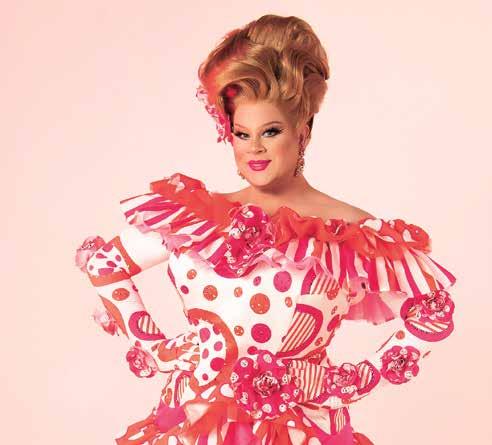
Our show, “You Can’t Stop the Drag,” is a rallying cry for the protection and celebration of this vital form of Queer expression, pushing back against any attempts to restrict or ban it.
On joining a Gay chorus:
So, I’ve worked with the Columbus Gay Men’s Chorus and hosted one of their shows before. …I would love to join a chorus. Last week, I just hosted the Cleveland North Coast Men’s Chorus…for their Pride show. And, you know, being in that room with those men and women singing songs and raising our voices together collectively,
it just felt like something I would love to do. Unfortunately, my schedule doesn’t allow it. I don’t have the time in my schedule for rehearsals. But I would love it. I mean, listen, if I weren’t Nina West, I would absolutely, wherever I was living, be a part of the chorus in my city. Right now, I do live in Columbus, Ohio, and so I would be so honored and proud to be a part of that chorus.
You know, I love everything it does for people. I love what it brings to communities — the extent of community, friendship, fellowship, friends, and family. It’s just all what it provides for people that is so impor-
tant: a creative outlet, an emotional outlet, a social outlet. It’s just fantastic. And I don’t know if people really understand the power of these choruses and what they mean to our communities fundamentally.
On Drag Race vs. All-Stars:
On All-Stars, I got to showcase everything I’ve mastered since my last stint on Drag Race. In the past five years, I’ve toured with Hairspray, [honed] my acting chops, worked with puppets, penned a kids’ book, and even starred in a movie with Weird Al Yankovic. Bringing all that experience back into the workroom, I reminded everyone that Drag Race isn’t just a reality show, it’s a platform for important community narratives. It’s a global brand that gives people, wherever they are, a chance to feel seen and connected.
My time on the show made me realize the profound impact it has on viewers’ lives, providing them with visibility, agency, and a sense of identity. As a fan-turned-contestant, I understood this firsthand, hearing countless stories of how seeing people like us on TV can be life-saving. So, I made sure to bring that awareness and authenticity to the program, knowing just how transformative and transcendent Drag Race can be.
On his dream competition: I would pick Patti LuPone, because I bet she’d be a hoot and a holler. I bet she’d be so much fun. She was the first thing that came to mind. I don’t know why I picked Patti LuPone because, God, I want her to sing with that gorgeous, brassy voice, but I picked Patti LuPone.
The Seattle Men’s Chorus’s Pride concert is June 22-23 at McCaw Hall. For ticket information, go to https:// Seattlechoruses.org.

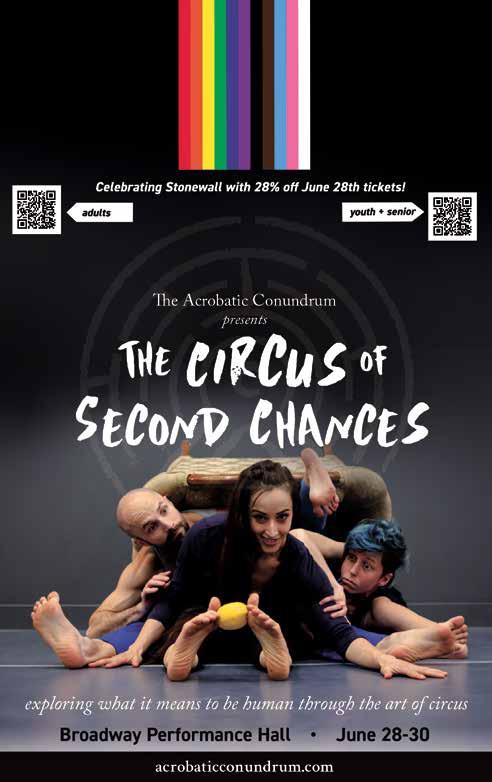



Five years ago, I reviewed a show for the SGN at Jazz Alley featuring a young, outand-proud crooner named Spencer Day, in the style of Michael Feinstein, Josh Groban, and Michael Bublé. We met backstage afterward and became fast pals.
When his LP Broadway Day came out in late 2021, I urged Jazz Alley to bring him back to Seattle. Earlier this year, my dream was realized when it was announced that Day would be returning for Pride Month. I was excited when we could finally catch up over Zoom a few weeks ago. Below are excerpts:
On the show at Jazz Alley:
“I’ve been working on a theme to embrace the revelry of this moment instead of dwelling on bittersweet memories. Even though it’s been a couple of years since the pandemic hit, many are still adjusting and grieving losses. Through humor, I encourage everyone to embrace their inner French woman or Peggy Lee, finding humor even in grief. It may sound dark, but it’s about assessing where we are and viewing things with optimism despite the odds. I’ve been writing a lot of new original songs, including some Broadway ones that I never fully got to explore during the release.”
On dream collaborators:
“There are a few other projects that I can’t announce just yet, but I’ll probably reveal them by the time I’m at Jazz Alley, and I’m pretty excited about a television show coming up that’s pretty cool. It’s a bit of a dream.

“But let me think. I would love to write for Adele. I have a couple of songs that I don’t need to sing with her; I’ll let her take the reins on that fully. But I would love to collaborate on a musical with her.
“Here in Mexico, Natalia Lafourcade is someone I would love to sing a duet with. But…when I heard Adele singing some-
thing, I thought, ‘Man, I have a couple of songs.’ I know she sings a lot of co-writes, but I would love to write with her.
“I enjoy my voice a lot, actually. It’s very specific, so I love writing for other people, because I get to hear my melodies in a way that [surprises even] me. It’s a thrill to hear someone else sing your song. Lady Rizo
has sung a couple of my tunes, and I know she’s a big Seattle artist.”
On future plans:
“That’s a very good question, and I think it’s part of the theme for the show I want to share with people: What’s next, and how do we dream big and stay hopeful despite so many mounting disappointments we’ve faced?
“For a lot of us, the last couple of years have made us question a lot about our lives, including our work. People have lost loved ones and faced health scares, and everyone, no matter where they fit on the spectrum, is aware that the status quo isn’t working for the majority. So, how do you dream realistically about what you’d like to achieve?
“One thing that’s very important to me is helping people on a local level. I’m excited to focus on some of the nonprofits I work with, like Border Angels and Stop AIDS Project, among others. But my passion project is down here, a mix of jazz and Mexican boleros. I’m excited to start premiering some of that.
“Also, I’ve been writing a lot lately. I had a real low period, but now I have an electronica project, some singer-songwriter pieces in Mexico, and…Broadway songs that I really want to do. It’s uncertain when we’ll get to record them, though. As you know, in journalism and other fields, we’re all just making it up as we go along.”
Spencer Day will be at Dimitriou’s Jazz Alley on June 18-19. For more info, go to https://jazzalley.com.
I must confess, there haven’t been many new shows in the last 18 years that have excited me as much as Spring Awakening. I’ve seen it at least four times and love every song on the soundtrack. Though it’s set in the 1890s, the characters resonate with the same repressed feelings we’ve all experienced in the last 20 years.
I was particularly impressed by actor Ricky Spaulding’s talent, having recently seen him in Born with Teeth at ArtsWest last winter. I couldn’t wait to chat with Spaulding over Zoom; below are excerpts.
On beginnings:
“…In sixth grade, I was in Joseph and the Amazing Technicolor Dreamcoat [at the 5th Ave] along with other young children, because the show has a children’s ensemble…
“I first did Spring Awakening…at the University of Washington in 2017, where I played Hanschen. Interestingly, there’s one other person in our cast who was in that production with me, Sage Cesaris. He played Ernst in that production, and he’s also playing Ernst in our production. So we’ve done this show together before.”
On the casting process:
“It was the first open call for the show, and they requested nonmusical theater songs, mentioning artists like Bob Dylan and the Beatles, aiming for a folk-pop-rock blend, which fits the show’s style. I brought my guitar, played a song by Julia Jaclyn, and felt I could sing in my own voice, unlike typical musical theater auditions, where I try to match a specific sound.
“After the initial audition, I returned five more times, reading for various roles, like Hanschen, Melchior, Georg, and Moritz.
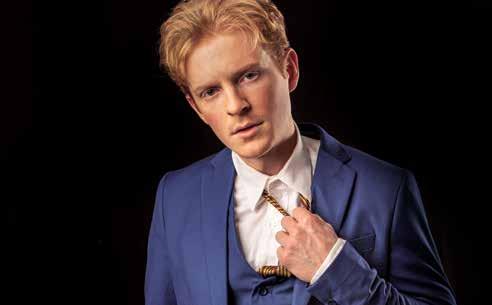
Eventually, I was cast as Melchior. Jay [Santos], our director, immediately delved into scene work, giving me a taste of what it would be like to work with her. It was an intense process, with multiple sessions before I received the offer.”
On his leading lady:
“Caitlin Sarwono, my co-star, has been fantastic. She studied music education, while I studied English literature, giving us diverse backgrounds beyond traditional musical theater. Despite this, we’ve both brought our strengths to the process. Our roles demand trust and involve significant intimacy, so establishing comfort and trust early on was crucial. With support from Jay and Ian Bond, our intimacy and fight choreographer, we’ve developed the necessary comfort as an ensemble to handle the sensitive material portrayed in the story.”
On being nude on stage:
“We haven’t completely ironed out what that moment is going to be. Jay has been very clear with us that she’s interested in the storytelling of it, obviously, and she’s not interested in gratuitous nudity or this sort of spectacle or titillation that can come from just seeing a nude actor on stage. She’s been very clear that we will do exactly as much as the moment requires to deliver the event of the scene and nothing more, nothing less.
“But I think that will entail some nudity. And I feel really comfortable with it, because I know that’s her approach. And I know that she has the attitude of ‘we will do what’s necessary, nothing more,’ so I don’t feel like it will be exploited or gratuitous in any way, which is really great.
“And then, as an actor, I’m really excited about moving outside of my comfort zone to do what’s necessary to service the story. So as long as I feel like what’s happening is
in service to the story, I’m pretty comfortable with pretty much anything.”
On keeping fit:
“In portraying characters like Robin Hood (in Village Theatre’s production last fall) and Melchior, I consider what the story requires physically. As Robin Hood, a legendary warrior, I felt it necessary to get into a specific physical shape to embody that role. However, for Will in Born with Teeth, his physicality isn’t central to the story.
“With Melchior, I interpret the text’s description of him being handsome and active to inform his physicality. Exercise is integral to my routine as an actor, not just for physical preparation but also for mental wellbeing. It helps me connect with my body and be fully present during rehearsals.”
On his favorite song in the show:
“I love how this musical fearlessly tackles nudity and profanity on stage. It delves into the danger of avoiding discussions about our bodies and sex, shedding light on how shame and taboos can hinder access to vital information. It’s crucial. Breaking away from traditional expectations of musical theater, we boldly present scenes of masturbation, sex, and nudity to spark conversations about challenging harmful taboos.
“That’s why ‘Totally Fucked’ is one of my favorite songs — it fearlessly confronts taboos, aligning with the play’s message. It’s thrilling to perform songs like this that provoke thought and push boundaries.”
Spaulding and the rest of the fine cast are at the 5th Avenue Theatre through June 30. For ticket info, go https://5thavenue.org.
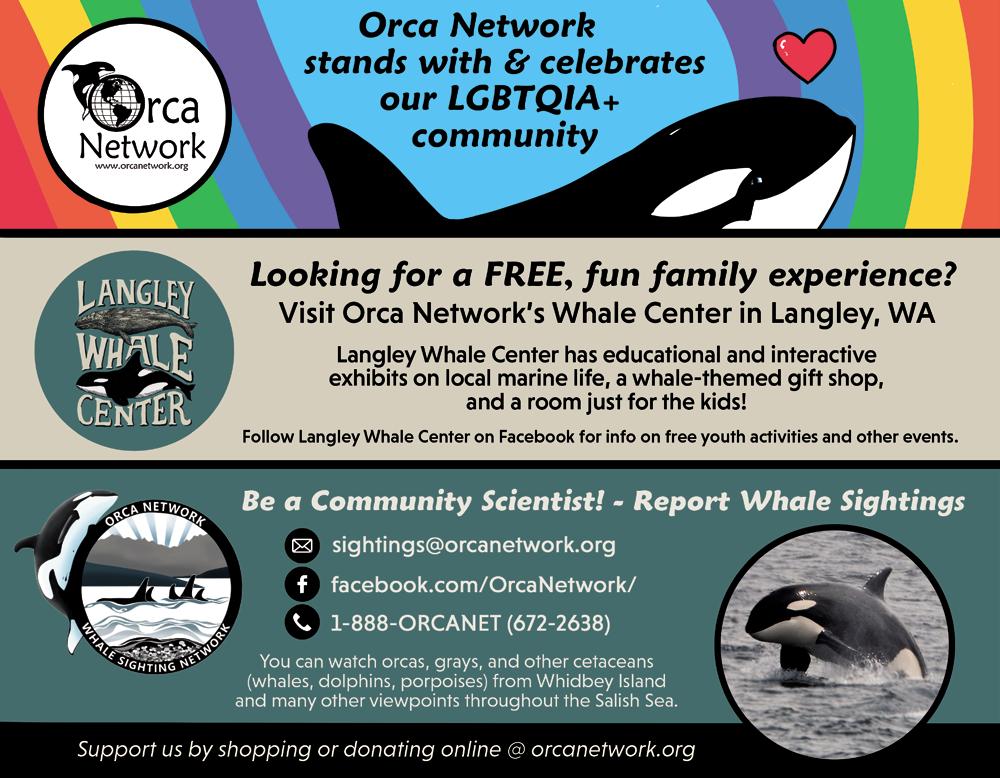

Calling all film geeks! The Interbay Cinema Society is preparing a magical triple feature of pioneering Queer director, cinematographer, and filmmaker Barbara Hammer’s most iconic works. “Hammer Me Queer” will be a celebration of her life and art, and the fiery path she blazed for future Queer people in the film industry throughout her 50-year career, which has led to her often being considered the mother of the Lesbian film genre.
Three of Hammer’s films, Nitrate Kisses Endangered, and Multiple Orgasm will be projected on 16mm at the Northwest Film Forum on June 22 at 7 p.m.
At just over an hour, Hammer’s first feature film, Nitrate Kisses, follows the daily life of four Queer couples in New York City. This documentary was revolutionary in exploring LGBTQ+ culture in the early ‘90s at a time when Queer people were hardly recognized in mainstream pop culture. The film received the Bear Award at
the Berlin International Film Festival, and a nomination for the Grand Jury Prize at the iconic Sundance Film Festival, despite conservatives railing against it for promoting “homoerotica.”
Filmed in 1976, Multiple Orgasm is a self-explanatory short film that combines erotic clips of female masturbation with others of rock formations. The work was highly controversial at the time but reflects the themes of women’s empowerment and sexual liberation, which Hammer came to be known for in her career.
Endangered reflects Hammer’s career and love affair with film. The 18-minute short combines imagery of celluloid with Hammer’s own hands as she physically sculpts her movie. An ode to the poetry of film, Endangered is as much a piece of art as it is a look into Hammer’s soul.
Due to the content of the “Hammer Me Queer” festival, admission will only be granted to patrons 18 and up. Tickets are $14 for general admission, $10 for students and seniors, and $7 for NWFF members.
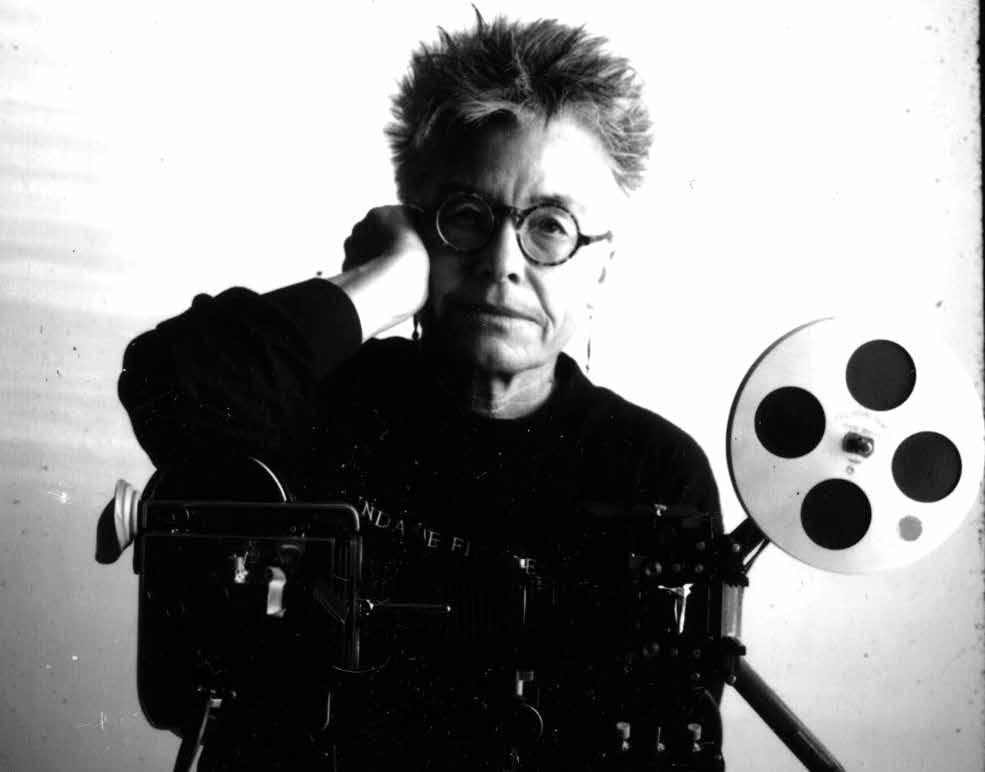
INSIDE OUT 2
Young Riley (voiced by Kensington Tallman) has entered puberty, and her primary emotions Joy (Amy Poehler), Sadness (Phyllis Smith), Anger (Lewis Black), Fear (Tony Hale), and Disgust (Liza Lapira) aren’t sure how to handle the situation. Things get even more confusing when a cadre of new emotions — Anxiety (Maya Hawke), Envy (Ayo Edebiri), Ennui (Adèle Exarchopoulos), and Embarrassment (Paul Walter Hauser) — all burst into Riley’s cerebral control room and proceed to take over.
That’s the setup for Pixar’s Inside Out 2 To say more than that would spoil the various twists and turns this strong sequel to 2015’s Academy Award-winning Insider Out takes en route to its heartwarming conclusion. Returning screenwriter Meg LeFauve teams up with co-writer Dave Holstein and director Kelsey Mann to craft a wonderfully graceful tale of self-actualization that had me reaching for tissues, and the younger viewers in my preview audience sat in rapt delight for practically every second of this feature’s briskly paced 96 minutes. Does this second chapter in the life of Riley rise to the same instant-classic heights as its predecessor? Not quite. Is it still phenomenally entertaining, and does it tell a fascinating story I got immediately excited about? You bet.
This sequel has something to say. The creative team isn’t content to just repeat what happened the last time around. Instead, they’ve constructed a narrative that shows how personality is shaped. It examines how memories — good, bad, and in between — pour the core foundation of a person’s emotional temperament, every piece a building block that takes us from childhood to adolescence to adulthood and beyond.
The central conflict involves Anxiety. This emotion feels the frantic need to rip control away from Joy and the rest of the primary emotions. It’s certain it knows what is best for Riley, and with the assistance of

Envy, Ennui, and Embarrassment, they’re sure they can guide their host down the right path toward happiness and acceptance. But while a little anxiety can go a long way, a lot of it can be unavoidably crippling, and it’s up to Joy and the other emotions to find that balance that will help Riley make life choices she can be proud of.
But whereas the original Inside Out wasn’t interested in gender binaries, this sequel does tend to be more conformist on that front. There’s not a lot of risk involved in how Riley presents herself. I do like that at her core, she still is an athlete, but there is more attention paid to standard concepts of femininity than the last time, and this somewhat lessens the universality of what she is dealing with. I also found it unavoidably disappointing. Thankfully, the writing is inventive and
imaginative. Riley’s battles with indecision, self-doubt, and, yes, anxiety are ones every human has been through. She’s at that age where friendships change and new worlds open up in ways that defy all expectations. One failure or unavoidable misstep can feel like a personal apocalypse. Every success is a sudden jolt of euphoria that can quickly give way to a paralyzing fear that this moment of ecstasy will never come again.
This is what Joy and her fellow primary emotions are dealing with. The way they journey through Riley’s psyche, searching for ways to incorporate Anxiety and the other new emotions, is full of surprises. How this ends up happening is even more so.
There’s an outstanding sequence in which Riley, sitting in a hockey penalty box, finds herself falling to pieces. She’s made mistakes that have hurt her best friends. She’s tried to
show off in front of a high school senior girl whom she greatly admires, and inadvertently made a fool of herself. Riley can’t handle it, and while everyone else continues to scrimmage, she experiences the worst two minutes possible. All alone, with no one to give her guidance. It’s heartbreaking.
It’s not a spoiler to say that Joy is there for Riley. So are all of the other emotions, including the new ones that have all come along with the onset of puberty. But how they help their girl through this internal conflict and the ways they work together to ease her pain and give her the confidence she needs to persevere overflow in cathartic imagination. Inside Out 2 grows with Riley, and by doing so, it shows its audience a spiritual mirror that reflects their own self-image. It’s worth peering into. It’s even more difficult to forget.













Anna (Renate Reinsve) is a single mother who cannot get over her grief over the recent loss of her young son. For unspoken reasons, she cannot look her own father Mahler (Bjørn Sundquist) in the eye, let alone share a quiet morning breakfast with him. He, in turn, has no idea how to help his daughter in her greatest time of need.
David (Anders Danielsen Lie) is an aspiring standup comic deeply and passionately in love with his wife Eva (Bahar Pars). On the eve of the birthday of their youngest child Kian (Kian Hansen), and with their teenage daughter Flora (Inesa Dauksta) off doing who knows what, Eva is killed in a horrific auto accident. The family is devastated.
Tora (Bente Børsum) is the last to leave the funeral of her beloved Elisabet (Olga Damani). She journeys back to a spacious empty house, and for all of the pair’s tasteful and expensive furnishings, the only things it appears to be filled with now are memories of the woman she loved.
Based on the novel by John Ajvide Lindqvist, the writer behind Let the Right One In and Border, this is the heartwrenching starting point for Handling the Undead, an exquisite examination of grief that leaves a lasting mark. Director and co-writer Thea Hvistendahl meticulously

paces the drama, insisting on analyzing her characters and their reactions to the unfathomable events they are all forced to reckon with in intimate detail, instead of focusing on the ghoulish horror slowly enveloping them.
And what may that be? On Oslo’s hottest day of the year, members of the recent dead awaken and travel back to their former loved ones. Mahler pulls his grandson from his grave after hearing him knocking from inside his coffin. Eva opens her eyes in the same hospital bed on which she died. Flora stumbles back inside her home as if she had been aimlessly sleepwalking around the neighborhood.
Each of these stories looks at what this reunification must be like for all of these individuals. Even though she knows something is catastrophically wrong, Anna becomes even more overtly protective of the boy than when he was alive. David, Flora, and Kian are spiritually discombobulated — the whiplash from being told Eva is dead to now being kept away from her by the hospital becomes a new trauma they cannot understand. Tora is emotionally overwhelmed when Elisabet returns to her, and the thought that she can spend her remaining years with the love of her life is keeping her from seeing the danger that’s quietly sitting at the kitchen table.
These are not George Romero zombies. Those walking into this horror-tinged melodrama anticipating some sort of blood feast will be severely disappointed. Hvistendahl and Lindqvist don’t follow the traditional path. Instead, they spend all of their efforts traveling through these three stories to showcase the various ways people deal with the death of a loved one. There are no cheap jump scares, no sudden outbursts of chaos or gore. Violence is (mostly) of the psychological variety and, more to the point, almost always self-inflicted. Some of this can come off as moderately ostentatious and impenetrably vague. This is by design. The terrors at the heart of this story are almost entirely internalized. How do you let go if the dead are suddenly brought back, even when you know they are no longer the person they used to be? Do you overlook those clues and cling to past memories? Or do you find a way to say goodbye for a second time? These are difficult questions, and none of them have simple answers. This means Handling the Undead won’t be for everyone. But Hvistendahl treats the audience with respect, her and Lindqvist’s reworking of the latter’s source material is respectful, intelligent, and overflowing in empathy. They refuse to judge their characters, allowing each to make choices — good, bad, whatever — that feel authentically organic to who they are and the situations they are experiencing. This is exactly how it should be. More to the point, it’s also fairly close to how it actually would be.
History has shown that living openly as a member of the LGBTQ+ community can be one of the bravest things a person can do.
Author Maureen Marshall knows a thing or two about bravery and Queer history. For the last ten years, she wrote steamy LGBTQ+ historical fiction under a pen name, but this year she decided to add her real one to the cover of her latest novel, The Paris Affair
“I was just fully embracing everything and it just felt like, ‘Dammit I’m going to do everything under my name,’ and just be me. It took long enough,” Marshall said in an interview with the SGN
A former high school teacher in Virginia, Marshall was wary of sharing her work, and her identity as a Queer person, with her community. After her 50th birthday, though, she had a change of heart. The Paris Affair includes a personal essay at the book’s end as Marshall’s way of formally coming out. Marshall had worked hard on all her historical novels, and she was finally ready to share them with the people she loved most. After she published the book, she shared it with her parents, who at first did not take it well. Despite their reactions, most of her friends and community were proud of all her writing accomplishments, including the most important people.
“My kids knew [I was Queer] long before there was a book in the making,” she said. “I thought, ‘Well, if I have my kids, then I have enough people who do love me.’”
Accuracy and connection
As a former history teacher, ensuring her books are accurate was essential. “I love to research, I am a big research fiend!” she said.
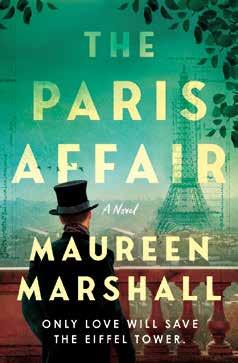
Before she even started writing The Paris Affair, Marshall cracked open French history books to learn everything she could about the inception of the famed Eiffel Tower. While she could easily fill a book with excerpts from the many primary sources she relied on, the difficulty in writing historical fiction is creating an intriguing plot and not oversaturating the readers with too many facts.
“With historical fiction, you just drop in enough nuggets so it’s interesting without beating anybody over the head with all the details,” she explained.
Writing Queer historical fiction can also be tricky, as many LGBTQ+ people could

not live their lives openly, so there are fewer records of what their experiences were like. Some authors rely on their imagination to fill in the gaps history leaves, but Marshall wanted to do her research to make sure that the Queer characters she brought to life were accurate to their period. “I did a lot of research on… Queer history, night clubs, and laws, and stuff like that. It was a mishmash of little pieces here or there,” she said. Marshall’s favorite part about history is finding the throughlines that connect the past to the present. She hopes The Paris Affair will help her readers make those connections. “I love how even though that was so long ago and everything was so dif-
ferent in the world, human nature is not different,” she explained. “I like to show the parallels of modern life compared to 1886 — as human history goes, it’s not that long ago. There were a lot of laws that were very different, but also there’s a lot that’s understandable and relatable. I want those parallels to be apparent.”
“The characters took over”
The Paris Affair is inspired, in part, by an old family legend. “I’m a writer, so I made it bigger and more interesting. I just ran with it,” Marshall said.
While her real family is from England, Marshall has always been interested in Paris, so she set her story there. “I took lots of little pieces and put them in a [metaphorical] Yahtzee cup and threw it out to see what would happen. The characters took over most of it,” she said.
Marshall hopes her nail-biting tome will be a popular choice for summer book clubs and is even willing to connect with reading groups if they’d like to discuss the story with her. With the book club demographic in mind, she hopes readers who discover her novel walk away from it with the understanding that Queer people — of all periods — are just like anybody else.
“I want them to see that the characters could be their neighbors now. It’s just the situations are slightly different, but people are people,” she said.
The Paris Affair is available now and can be found at Elliott Bay Book Company and Third Place Books. Marshall’s next book, a 1920s Hollywood reimagining of Anne Boleyn, Henry VIII, and Catherine of Aragon, is anticipated to come out sometime next year.


